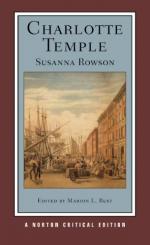He was immediately introduced, found she was the owner of the jewels, and was invited to breakfast the next morning in order to their restoration. This whole evening Montraville was honoured with Julia’s hand; the lively sallies of her wit, the elegance of her manner, powerfully charmed him: he forgot Charlotte, and indulged himself in saying every thing that was polite and tender to Julia. But on retiring, recollection returned. “What am I about?” said he: “though I cannot marry Charlotte, I cannot be villain enough to forsake her, nor must I dare to trifle with the heart of Julia Franklin. I will return this box,” said he, “which has been the source of so much uneasiness already, and in the evening pay a visit to my poor melancholy Charlotte, and endeavour to forget this fascinating Julia.”
He arose, dressed himself, and taking the picture out, “I will reserve this from the rest,” said he, “and by presenting it to her when she thinks it is lost, enhance the value of the obligation.” He repaired to Mr. Franklin’s, and found Julia in the breakfast parlour alone.
“How happy am I, Madam,” said he, “that being the fortunate instrument of saving these jewels has been the means of procuring me the acquaintance of so amiable a lady. There are the jewels and money all safe.”
“But where is the picture, Sir?” said Julia.
“Here, Madam. I would not willingly part with it.”
“It is the portrait of my mother,” said she, taking it from him: “’tis all that remains.” She pressed it to her lips, and a tear trembled in her eyes. Montraville glanced his eye on her grey night gown and black ribbon, and his own feelings prevented a reply.
Julia Franklin was the very reverse of Charlotte Temple: she was tall, elegantly shaped, and possessed much of the air and manner of a woman of fashion; her complexion was a clear brown, enlivened with the glow of health, her eyes, full, black, and sparkling, darted their intelligent glances through long silken lashes; her hair was shining brown, and her features regular and striking; there was an air of innocent gaiety that played about her countenance, where good humour sat triumphant.
“I have been mistaken,” said Montraville. “I imagined I loved Charlotte: but alas! I am now too late convinced my attachment to her was merely the impulse of the moment. I fear I have not only entailed lasting misery on that poor girl, but also thrown a barrier in the way of my own happiness, which it will be impossible to surmount. I feel I love Julia Franklin with ardour and sincerity; yet, when in her presence, I am sensible of my own inability to offer a heart worthy her acceptance, and remain silent.” Full of these painful thoughts, Montraville walked out to see Charlotte: she saw him approach, and ran out to meet him: she banished from her countenance the air of discontent which ever appeared when he was absent, and met him with a smile of joy.




